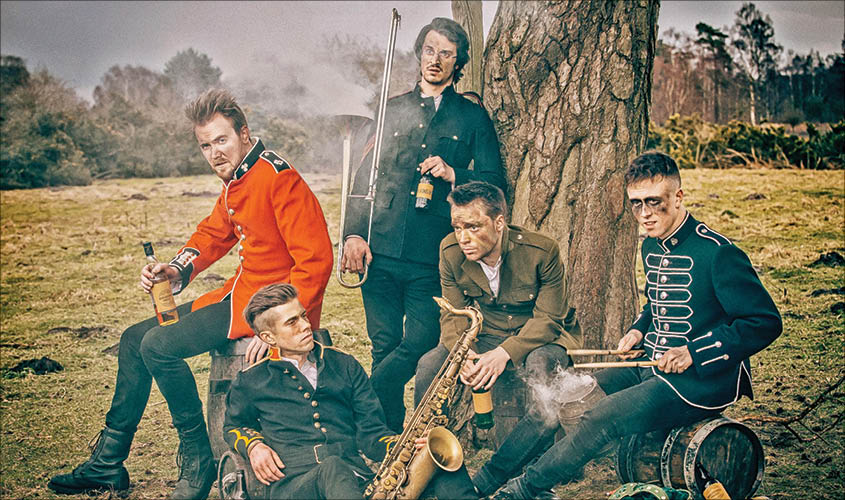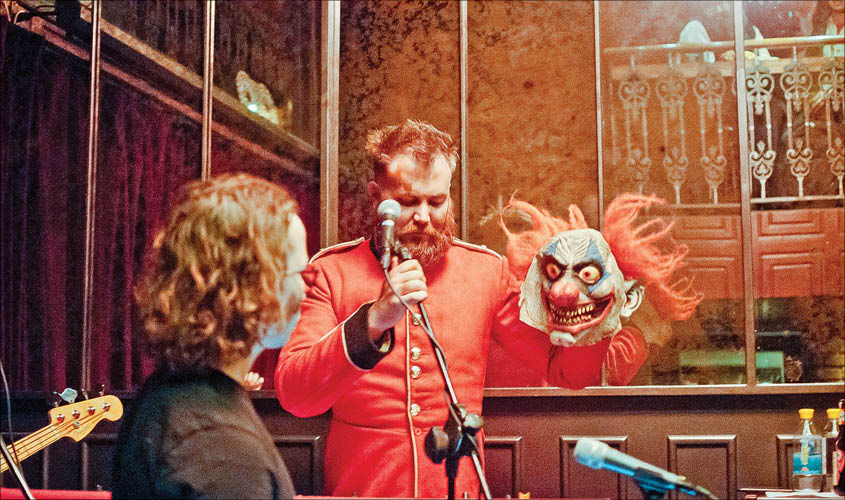British musician Dave Morecroft, who is part of the five-member punk-jazz band WorldService Project, speaks to bulbul sharma about creating music and performing live.
The London-based punk-jazz outfit, WorldService Project was recently in India to perform at the fourth edition of Giants of Jazz, a 10-day music festival organised by the Piano Man Jazz Club, Delhi. Dave Morecroft is the vocalist and keyboardist in the five-member band, and comsposes songs as well. He speaks to Guardian 20 about WorldService Project and their musical influences.
Q. How did you like performing at the Piano Man Jazz Club
in Delhi?
A. It was great. It’s a wonderful venue and a very unique space that lets you connect with the audience. You really feel like you can create an atmosphere by interacting with the entire audience because the stage is visible from all angles. It really creates the kind of environment that according to me should be in a jazz club, between the musicians and the audience. It’s really fantastic.
Q. What’s your favourite thing to do when you’re in India? And what do you like the most about this country?
A. Food is definitely very high on the list. We’re all big fans of Indian cuisine. We also happened to visit many temples this time. We went to Old Delhi and visited a Jain temple, a Sikh temple, a Hindu temple—it’s so different from our own culture. I really enjoy observing people living their lives in India. I try to get into their shoes and imagine things from their perspective, understand how they feel going around their everyday lives. At the temples, you really see people in a very raw way, and it’s very emotional.
Q. What is the story behind your band name, WorldService Project?
A. It started as a tribute to the BBC World Service, because my father worked there for a number of years and when we first did a demo, he snuck us in the studio one Sunday morning and we managed to record an EP for free in that studio. However, the meaning behind the name to me has changed now because the band has travelled so much and because our new album is called Serve. We are really trying to live up to the name, to be a band that’s trying to serve people wherever we go.
Q. Your band interacts with the audience a lot during performances. How do you think it adds to the overall experience of the gig, for you and for the audience?
A. Well, I hope for the audience we really add something. We are trying to make a show; it’s not just a gig. I have been to so many jazz gigs or concerts that I have found visually boring or have found them to be very unengaging, even if the music was really interesting. So I hope it [the interaction] really adds something. For me, I think you stimulate one or two senses of someone from the audience if they’re sitting and listening to jazz. Obviously you’re mainly stimulating their aural sense, but as soon as you add a story to it or a narrative, or as soon as you add a visual element, or just the costumes that we wear, or the energy that we have on stage—it just immediately stimulates people in a different way, and makes it a more rounded show. I love engaging with people and making our shows theatrical. It’s part of my makeup and background.

Q. Two very different musical genres, punk and jazz, define your style of music? How do you manage to put them together?
A. We think of punk as an attitude and jazz as a genre. So we play jazz with a punk attitude. Our music is very thrashy, it has an anti-establishment vibe to it. It has a heavy sound and there are of course jazz elements to it because there are improvisations and horns blowing solos over a rhythm section.
Q. Who are your musical influences?
A. There are many actually. I’ve grown up studying classical music mainly, so lots of 20th-century music, 21st-century music, and contemporary classical composers from [Olivier] Messiaen to [Joseph Maurice] Ravel have influenced me. I listen to a lot of rock and pop music from the ’80s and ’90s because I am that old, unfortunately [laughs]. Then I got into much more progressive and heavy music. I started to check out more psychedelic stuff with Mr Bongo, Mike Patton and others. Then I got a heavy crossover with John Zorn [American composer], and Charles Mingus [American jazz musician] also had a great impact on me. So WorldService Project is like you take all those ingredients and put them in a bowl and you mix them around.
Q. How do you put the individual experience and expertise of your band members together in a way that helps in creating better music?
A. The music is half written and half explored. A lot of improvisation happens during the process. We, as a band, play a lot together. So when I am writing music I keep their strengths in mind, I know the kind of music that interests them and I try to give them a very juicy section that they can enjoy working on. And of course, you have to play as per the strength of your band, you have to allow them freedom. You have to let them loose but also try to keep them together. It is a band, so there has to be limits and boundaries too.
Q. What led to the creation of Mr Giggles, the clown character you play when performing live? What do you think the character adds to your shows?
A. I was terrified of clowns as a kid and that fear led me to play out that character on stage in a kind of a cathartic way, trying to expel my own fears of clowns. I think it really gives me the capacity to instil fear in others, because I know why clowns are so scary and disturbing. He [Mr Giggles] has gone through a journey as a character, from a weird, funny, quirky thing to a more malicious character. In the shows, it is an additional element. It makes a spectacle rather than just
a gig.
Q. You have done a lot of shows across America, Europe and Asia. How have your travels influenced your music?
A. Everything in your life influences your music. The experiences you have, where you go, whom you meet influences who you are and the kind of music you write. Having toured quite a lot—we have performed both at tiny venues and big festivals; we have performed for 6,000 people and just for six people too—all of these experiences make you very flexible. They also help your music to grow and help you understand how your music is going to fit into different places and in different cultures.

